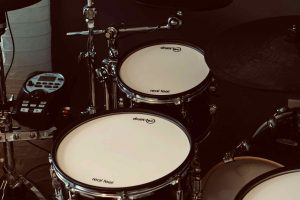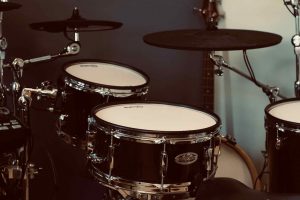Learning a new instrument takes time and dedication, and often for beginners, it’s all too easy to get impatient or frustrated if results aren’t immediately forthcoming. The best way to combat this and stay motivated by making regular progress is to practice regularly. But how should this look exactly when planning your schedule? Below, we’ll take a look at some tips on how often you should practice the drums.
How long does it take to get good at drums?
It takes 20 hours to get good at drums, but 10,000 hours to become world-class.
Learning anything new is difficult, and it is especially tough at the beginning of your journey, where it’s easy to make mistakes. There are plenty of experts who’ve looked at how long it takes to get good at any new skill, and we can apply this to drumming too. Josh Kaufman, the author of The Personal MBA, claims it takes 20 hours to go from “knowing nothing to being pretty good”. From there, more and more practice is the key to becoming even better.
Ever noticed how world-class athletes and pro drummers still practice their craft? This alone shows how important building good habits for regular practice is. It takes 10,000 hours to become world-class at any skill, according to Malcolm Gladwell in his book “Outliers: The Story of Success.” Learn more about how long it takes to become a great drummer or read on for tips on planning your practice sessions.
How many hours a week should I practice drums?
If you can, practising for a short time between 3 and 4 times a week beats a single long session each week. When you’re learning something new, it can be difficult to return after a break, even if it’s just 7 days. You may find yourself trying to remember what it was you learnt the previous week, spending more of your time recovering old ground instead of moving on to something new.
When you practice more regularly, your memory of your previous session is fresher. So while you’ll still need to recap what you did last time, you should find you can move on to something new more swiftly.
The other benefit of aiming to practise 3 or 4 times a week means the impact is not so bad if you were to miss a session. Compare that to practising weekly, where missing one session means you’d end up with two weeks off drumming.
How long should you practice drums a day?
An ideal time to spend on each of your drum practice sessions is between 30 and 45 minutes. You can split up your sessions into blocks to help keep things structured:
- 10 minutes recap of what you learnt last time
- 10 minutes learning a new drumming skill
- 10-25 minutes practising the new skill
Why only practise 30 to 45 minutes per day? While you can practise for longer if you have time, you’re likely to find that setting realistic expectations will lead to better results. It’s important to remember that while you might feel motivated to learn the drums right now, you might not always feel the same way before a session, especially if you’re learning something challenging and can’t seem to make a breakthrough.
By committing to a modest amount of practice regularly, the barrier to getting started is lower. As a result, you may feel more motivated to start practising that day if you know you only need to commit to 30-45 minutes.
Building drum practice into your daily routine
With a regular practice goal in mind, the next step is ensuring this works with your schedule. I like to block out time in my calendar when I want to learn something new. The reason why I do this is when I’m learning something brand new, having a practice session for that skill is not yet a habit, so actually starting that session is not always instinctive. Without a prompt in my calendar, I’m likely to forget to do it. If you find yourself forgetting to practice, then blocking out time can help.
Another method for ensuring you stick to your practice schedule is habit stacking, which is a concept advocated by self-improvement expert James Clear. You’ll already have habits that you do every day, for example taking a shower, having breakfast, or making a cup of coffee.
Habit stacking is a concept where you tack a new habit onto one of your existing habits, so when you do the existing habit that comes naturally, you’re prompted about the new habit you’re building. In time, that new habit becomes second nature.
This is how I ensured I stuck to my goal of practising three times per week when I wanted to learn some new drum rudiments. I already make a habit of having breakfast daily, and I’d go to the gym twice a week before work. On the three days mid-week when I didn’t go to the gym, I habit-stacked practising drum rudiments onto the back of having breakfast. That way, practice on my snare pad felt like an extension of my existing morning routine, and it helped me stick to my drumming schedule.
Using the 80/20 rule to learn drums
The 80/20 rule in drumming means spending 20% of your time learning rudiments and 80% of your time learning songs. This is a drumming variant of the Pareto Principle, which is an observation that 80% of outcomes come from the most important 20% of the inputs.
I have seen several writers explaining different versions of how the 80/20 rule or Pareto Principle applies to drumming, but in my opinion, it can be simplified to one simple fact – practising rudiments is boring but important, whereas learning songs is fun.
Sticking to the 80/20 rule means you’re disciplined enough to make progress on the boring but important stuff, while playing songs keeps you motivated.
Wrapping up: Do you need to stick to the same schedule forever?
Hopefully, you’ll always have the passion and motivation to practice the drums! But as you develop in your drumming journey, you might decide to focus on honing your craft in specific areas. For me, as a rock drummer, I was never super interested in going beyond the basics in other genres like reggae or jazz, so once I’d mastered enough to be competent, I focussed on learning things that would help me play the music I enjoy.
Similarly, I tend to cycle what I do in my practice sessions depending on what my goals are at the time. During the pandemic in 2020, I double down on honing my rudiments as I knew it was an area I could improve upon – time well spent while playing with my band was not possible. After about six months I was seeing some good progress against my goals, and I shifted more towards playing along to drumless tracks and incorporating my newfound chops into my music.
If you’ve not yet started to learn the drums and need some more tips on where to start, find out how to learn the drums without a drumkit, or if it’s better to learn electronic or acoustic drums.




